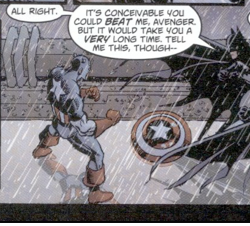http://www.reuters.com/article/2014/09/26/us-usa-marvel-kirby-idUSKCN0HL2EZ20140926
Wonder how much the "go away" check was for?(Reuters) - The legal war between comic book art great Jack Kirby's heirs and Marvel Entertainment over the rights to Iron Man, Captain America and other superhero icons has ended, not with a climactic final battle but with a settlement announced Friday by both sides.
The settlement came as the U.S. Supreme Court was set to discuss whether to take up the long-running case. The terms of the deal were not disclosed.
It was the latest chapter in the dispute over Kirby's claim on rights to the popular, lucrative Marvel comic and movie characters co-created with then-editor and writer Stan Lee during the 1960s.
The wider dispute, dating back well before the court case, was what share of the credit for creating Iron Man, the Hulk and others was due Kirby.
"Marvel and the family of Jack Kirby have amicably resolved their legal disputes and are looking forward to advancing their shared goal of honoring Mr. Kirby's significant role in Marvel's history," said a joint statement from the heirs and the Walt Disney Co subsidiary.

